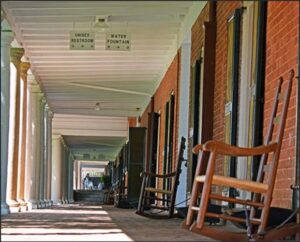
by James A. Bacon
Forty-seven University of Virginia students have been offered a room on the Lawn for the 2023-24 academic year. They were selected from a pool of 152 applicants, reports The Cavalier Daily. The number of applications was down from 189 last year and 221 two years ago.
Why the decline?
There was a time when residence on the Lawn was a coveted honor. Does the fall-off in applications reflect a sentiment among UVa students that life on the Lawn is less of a privilege than it once was? Are students today more likely to find the living conditions — such as the necessity to walk outside to reach a bathroom — too primitive for comfort? Alternatively, do some students believe the Lawn selection is stacked and see no point in applying?
The Cavalier Daily does not ask the question. Those of us who are not part of the selection process are left to speculate.
Here’s a clue: the newspaper article reports the demographic make-up of the Lawn residents. The collection and dissemination of such data reflects upon the priorities of those involved in the selection process. As the old saying goes, you manage what you measure.
Reports the CD:
This year, consistent with a smaller applicant pool, fewer students of color were offered a Lawn room. For the 2023-24 academic year, 36 percent of Lawn rooms were offered to students of color — compared to 47 percent last year.
Eight Lawn rooms were offered to African American students — 17 percent of the offers compared to last year’s 20 percent. Seven offers, or 15 percent, were awarded to Asian or Asian Pacific Islander students, five fewer offers than the previous year. Offers to Latinx students increased to a total of five rooms — or 11 percent of the total — which is two more than last year’s offers. (Editor’s note: According the CD’s own figures, “students of color” received 43% of the offers, not 36%.)
Students offered a spot on the Lawn are expected to further “the ideals and traditions of the University” as well as build “an inclusive and vibrant community while residing on the Lawn,” reports The Cavalier Daily.
Students are selected by a Lawn Selection Committee of 60 fourth-year students, none of whom are permitted to live on the Lawn. According to Student Affairs’ Application FAQs (my bold):
There are 32 ex-officio student members of the Lawn Selection Committee who represent a diversity of experiences and perspectives at U.Va., including: representatives from each of the seven academic schools offering undergraduate degrees; the Senior Resident of the Lawn (non-voting member); the President of Student Council; the Chair of the Honor Committee; the Chair of the University Judiciary Committee; representatives from the Pan-Asian Leadership Council, the Asian Student Union, the Black Student Alliance, the Black Presidents Council, the Global Student Council, the Jewish Leadership Council, the Inter-Fraternity Council, the Inter-Sorority Council, the Cultural Organization for Latin Americans, the Middle Eastern Leadership Council, the Multicultural Greek Council, the Muslim Students Association, the National Pan-Hellenic Council, the Native American Student Union, the Queer Student Union, the Student Athlete Advisory Council, the Fourth Year Trustees, the Student Veterans Association, the Student Disability Alliance, the Transfer Student Peer Advisors, and the Black Student-Athletes Offering Service and Support.
The rest of the student representatives are selected randomly on a first-come, first-serve basis.
In other words, 11 representatives come from student organizations representing ethnic, sexual, or gender identity groups. It is unknown from the Student Affairs website description whether the “randomly selected” students are urged by any of these groups to step forward and participate.
Who decides upon this particular process? The website FAQs explain:
The University Dean of Students serves as the chairperson for the Organizing Committee, which includes the following members: the Dean of the Office of African-American Affairs, the Director of Information Technology in Housing & Residence Life, the Senior Resident of the Lawn, and the presidents or chairpersons of the following groups: Student Council, the Honor Committee, the University Judiciary Committee, and the seven undergraduate school councils (Architecture, Batten, College, Commerce, Education, Engineering, and Nursing).
The Organizing Committee is also responsible for determining the selection criteria, the content of the Lawn application, and training the Selection Committee on the criteria and process of selection.
The Dean of African-American affairs’ appointment to the selection committee introduces a clear identity-group orientation to the selection process. The same might be said of the Dean of Students, whose website expresses a commitment to Diversity, Equity & Inclusion; in particular support for:
- Multicultural students
- Veterans and military
- Students with disabilities
- First-generation and low-income students
- African-American students
- Students facing food insecurity
- LGBQT+ students
Not surprisingly, minority students are awarded Lawn residencies at disproportionate rates.
African-American students represented 7.1% of the undergraduate student body, according to UVa’s Diversity Dashboard (which was last updated with 2020 data), yet African-Americans were awarded 17% of the offers.
Asian-Americans, comprising 12% of the undergraduate student body, received 15% of the offers.
Hispanics, representing 7.1% of the undergraduate student body, received 11% of the offers.
Making comparisons a bit tricky: the Diversity Dashboard breaks out multi-racial students and non-resident aliens as separate groups. It is not clear if the selection committee does.
Another factor complicating any analysis is the fact that Student Affairs does not provide the breakdown of the applicants by race, much less by gender or sexual orientation. Thus, it is unknown whether favored identity groups are selected for Lawn residency at higher rates than others.
Insufficient information is made public on the UVa website to conclude with any certainty if identity-group favoritism enters into the selection process. But the Organizing Committee should be concerned by the declining number of applications, and, given the facts cited above, it should inquire into whether perceived favoritism in the selection process might be the explanation.

Leave a Reply
You must be logged in to post a comment.